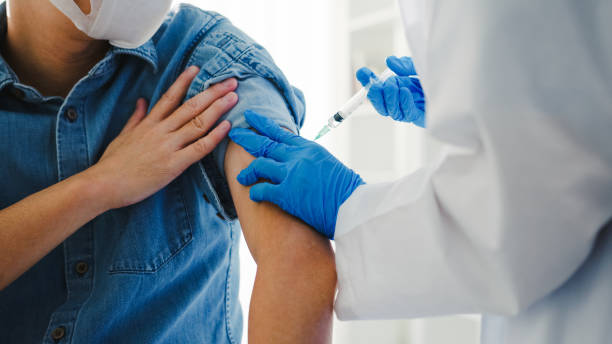Vaccinating yourself and your family against serious transmissible diseases is one of the most important steps you can take to stay healthy. Vaccines work by making your own immune system work better and faster. But, you may have some questions on how and why vaccines are so important and if they are safe.
What is the immune system? How does the immune system work?
The immune system is your body’s defense against harmful viruses and bacteria that cause diseases like polio, measles, influenza, pneumonia, meningitis and COVID. Exposure to these germs sets off a race between these organisms trying to multiply in you (and then spread to other people) versus your body’s immune system fighting back and trying to control and stop this invasion (AKA, infection). Your immune system uses various weapons to fight back against these germs, like antibodies, specialized cells that recognize these invaders and then memory cells in case you are exposed again (this is called immunity). In this war of microbes against your immune system, the resulting inflammatory response often leads to the symptoms of disease, some of which can lead to permanent damage to your lungs, brain, heart and other vital organs or even death. For people with vulnerable immune systems (like infants, children, elderly, pregnant women and those with immunodeficiency from cancer, HIV or other diseases), unvaccinated people are at highest risk for the most devastating outcomes.
How do vaccines work?
Vaccines work by using a mimic of the disease-causing germ that does not cause full- blown infection. Usually, this is done by exposing your immune system to a protein or a killed or weakened version of the germ and stimulating a protective antibody and cellular response without causing the actual disease. This way, if you come in contact with the actual germ, your body’s defenses are primed and ready to stop the organism before it can cause a full infection and get you and your loved ones sick.
“Herd immunity” happens when enough people in a community become immune to a germ, thus stopping its spread and keeping the most vulnerable children and adults from getting sick or even dying. A vaccination stops a germ’s outbreak from spreading in a neighborhood the way firemen stop a fire from burning down the whole forest.
What was life like before vaccines?
Smallpox probably emerged 300-400 years ago. During the 18th century, smallpox killed nearly 400,000 Europeans (including five kings) and was responsible for a third of all blindness. 20-60% of those infected with smallpox (and 80% of all children) died from it. During the 20th century alone, nearly 300 million people died of small pox.
1796 represented a watershed era for the fight against smallpox and for medical history. In that year, Dr. Edward Jenner, an English physician and scientist, pioneered inoculating cowpox, a mild cow disease that proved to very effective and safe at preventing the deadly disease of small pox. This represents the world’s first effective vaccine.
What are some examples where vaccines have made a difference?
Routine vaccinations protect against 14 diseases: polio, tetanus, influenza, hepatitis B, hepatitis A, rubella, Hemophilus influenza, measles, pertussis (whooping cough), pneumococcal disease, rotavirus, mumps, chickenpox and diptheria.
The impact of vaccines on infant deaths is astounding. In 1974, one in ten newborns died before reaching their first birthday. Over the past 50 years, that rate decreased by over TWO-THIRDS. Researchers found that vaccines alone saved 154 million lives globally (including 101 million infants) -or approximately six lives every minute.
The COVID vaccination program has also had tremendous success. For COVID, researchers at Imperial College London’s MRC Centre for Global Infectious Disease Analysis used data to compare countries where vaccines were available versus those lacking vaccines. They found 19.8 million COVID-19 deaths were prevented in 185 countries during the first year of COVID-19 vaccinations – 63% lower than if the COVID vaccine had NOT been available.
Are vaccines safe? If I take a vaccine, will I catch the disease I am trying to prevent?
Before vaccines are approved by the FDA, they are extensively studied in clinical trials of many, many people. No vaccine (or for that matter, food or medication) is 100% safe in EVERY person, because each person’s body reacts differently, but the benefits of vaccines far outweigh the risks. Even after vaccines achieve FDA approval, the CDC and FDA remain vigilant on their safety and surveil side effects and reaction via the Vaccine Adverse Event Reporting System (VAERS). If a problem is found with a vaccine, the CDC and FDA inform local health departments, medical providers and the public.
Most people have only mild side effects after vaccinations, as their body makes an immune response. The most common side effects are fever, achiness, fatigue and soreness at the injection site. Such side effects last only a few hours to days and it is uncommon for side effects to be long-lasting.
What vaccines should I take? How about my family?
A person’s age, travel history and medical conditions often determine recommendations for various vaccines. All adults should make sure they are current on Flu, Tdap (tetanus, diptheria and whooping cough) or Td (tetanus and diptheria) vaccines. Of course, there are some vaccinations that should be started in infancy and childhood (e.g., measles, mumps rubella and pneumonia). Likewise, some vaccines are especially important to take as you age to prevent illnesses like cervical cancer, meningitis, zoster (AKA, shingles), hepatitis A and B and pneumonia. Travelers may want to be vaccinated for disease that are prevalent in the areas they are visiting (like yellow fever or typhoid). Always check with your medical provider to make sure your vaccines are current and you are fully protected for every stage of life and travel plan.
Dr. Jason Leider, M.D., is the HIV Medical Director at NYC Health + Hospitals/Jacobi.




















